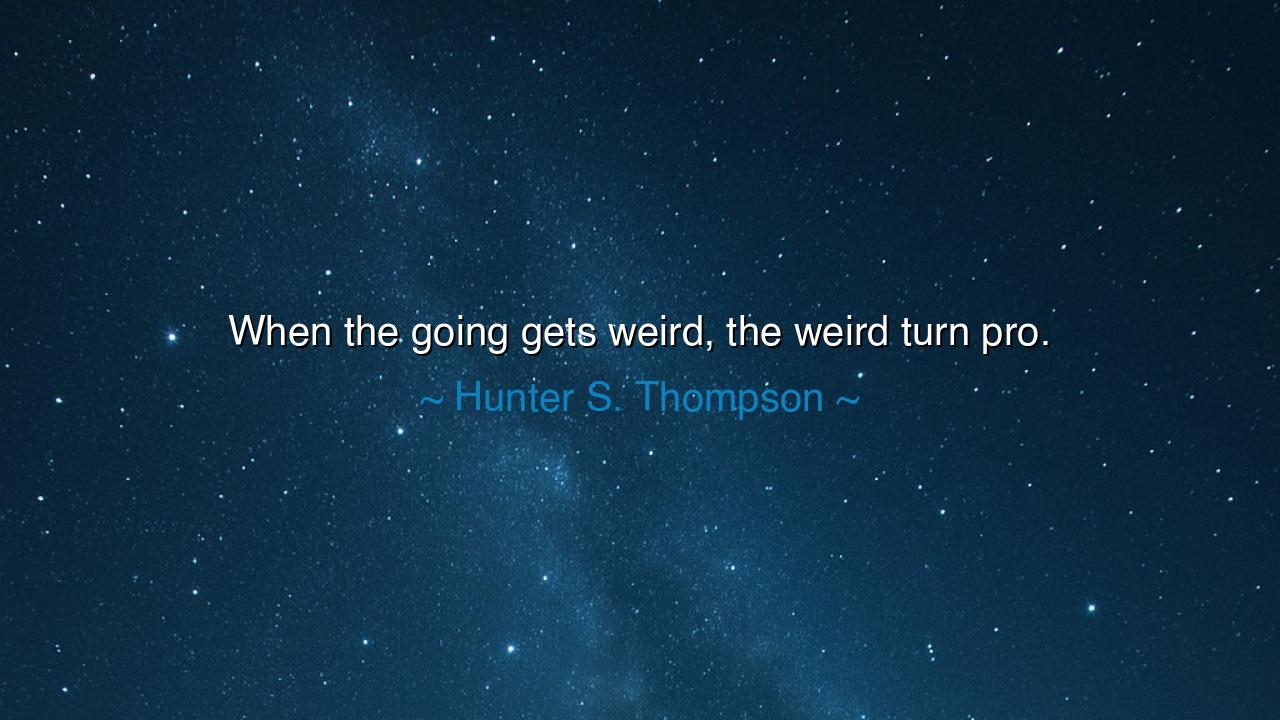
When the going gets weird, the weird turn pro.






In the turbulent days of the twentieth century, when the world seemed to tilt between chaos and revelation, the fiery pen of Hunter S. Thompson carved a phrase into legend: “When the going gets weird, the weird turn pro.” These words, half battle cry and half satire, reveal a truth as old as humanity itself—that in times of disorder, it is not the ordinary who thrive, but those who have learned to master the chaos. For when the storm rages and the familiar collapses, the strange becomes strength, and the weird ascend to their rightful place.
What is this weirdness of which Thompson speaks? It is the refusal to conform, the courage to walk the path that others fear, the instinct to embrace uncertainty rather than flee it. In a world where normality falters, the eccentric, the visionary, and the unorthodox discover themselves at home. To “turn pro” is not merely to survive but to rise with skill, to take what was once mocked and wield it as mastery. Thus Thompson declares that the very traits society dismisses as odd may prove to be the keys of survival when the going gets strange.
The ancients, too, bore witness to this law. Recall Diogenes of Sinope, who dwelt in a barrel, mocked kings, and lived like a madman. In times of stability, he was scorned as a lunatic. But when Alexander the Great came to him and asked what gift he might offer, Diogenes replied, “Stand out of my sunlight.” In that moment, the world saw that his weirdness was wisdom, his refusal to bow was greatness. The age was strange, and the strange man stood as master of it.
Thompson himself lived his words. In the era of Vietnam, Watergate, and cultural upheaval, he did not seek to be a polite journalist recounting facts. He became a gonzo prophet, hurling himself into the heart of madness, reporting not from the outside but from within. The chaos of the age demanded not detached observation but immersion, and Thompson’s weirdness became his weapon. He turned professional in madness, making sense of what others could not, because he had long been training in the language of the strange.
This teaching reveals both challenge and hope. For many cling to normality as to a raft, fearing deviation. But when the going gets weird, the raft breaks apart. Only those who have learned to swim in strange waters endure. The lesson is not to fear your eccentricities, your difference, your strangeness, but to cultivate them with discipline. In times of calm, they may mark you as odd. But when the storm comes, they may prove your salvation.
History offers us another witness: Winston Churchill, eccentric in speech, stubborn in habit, unpredictable in conduct. In times of peace, many dismissed him as difficult, outdated, even strange. But when the world descended into the darkness of the Second World War, it was precisely his strangeness—his fiery rhetoric, his refusal to yield, his bulldog defiance—that turned him into the champion of a nation. In weird times, the weird turned pro, and history was saved.
So let the words of Hunter S. Thompson be remembered not only as wit, but as wisdom: “When the going gets weird, the weird turn pro.” Do not despise your oddness. Sharpen it, train it, wield it. For life will bring seasons of strangeness, when the normal tools fail and the ordinary collapse. In those hours, it will not be conformity that saves, but creativity; not sameness, but strangeness. Cultivate your weirdness with courage, so that when the world trembles, you too may turn pro.






AAdministratorAdministrator
Welcome, honored guests. Please leave a comment, we will respond soon